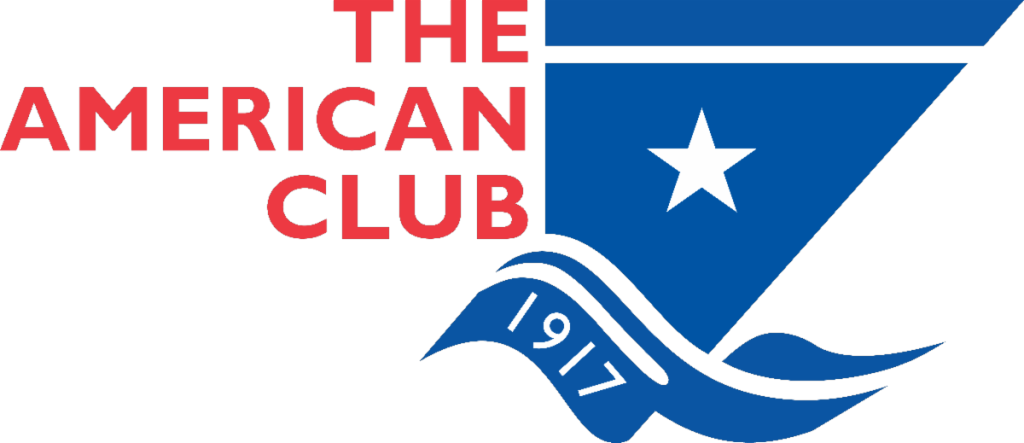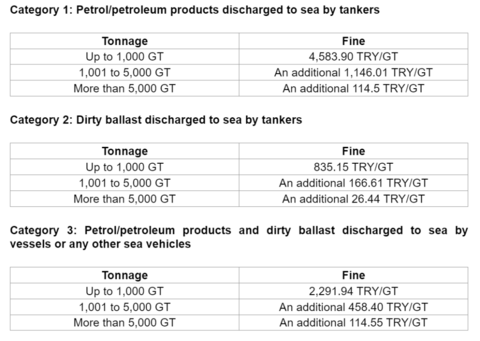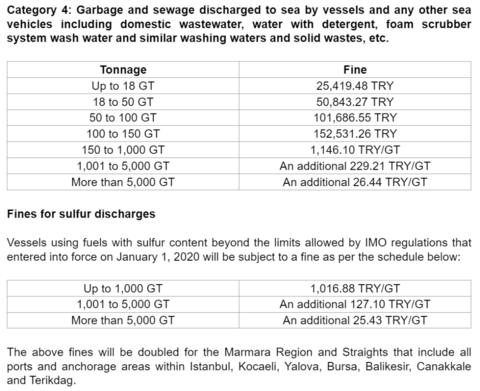
| JANUARY 3, 2025 |
| ENVIRONMENTAL POLLUTION FINES IN TURKEY: AN UPDATE |
| A revised pollution fine tariff schedule has come into effect as of January 1, 2025. In the event of sea pollution, fines may be levied by the Turkish Environmental Protection Agency (EPA) or by local Harbor Masters. For 2025, these fines will increase by 43.9% over those which applied in 2024. Pollution fines levied by the EPA The 2024 fine schedule has been separated into four categories as summarized below in Turkish Lira (TRY) |


Fine adjustments
The fines, as noted above, will be adjusted considering the following:
- Repetition of the same act by a vessel within three (3) years of the date of the first fine will result in the doubling of the fine and tripling of the fine for any repetition of the act thereafter.
- The fine will be tripled if the owner of the vessel that caused the pollution is a legal entity that is registered in Turkey.
- If hazardous waste or material of a similar nature is released or dumped in Turkish waters, the fine imposed will be 10 times the fine as set forth in Category 1 above.
- If the owner of the offending vessel cleans up the pollution itself, by using its own means and efforts, the administrative fine shall be levied at 1/3 of the total amount.
- An additional administrative fine will also be levied for vessels that are of 100,000 GT or more.
If the fine is paid prior to the vessel sailing within 30 days, the fine will be reduced by 25%.
Important notes
Any video footage or pictures taken by environmental officers, the coast guard or otherwise can only be released by court order. However, officers do release such records to P&I club representatives or agents unofficially upon occasion.
Owners are entitled to lodge an appeal to any fines before an administrative court within 30 days of the fine’s notification date. However, appealing the fine will not result in lifting of a fined vessel’s arrest order and appeals have a low probability of success.
Thus, Members are recommended to consider paying any fines within the appeal period in order to benefit from a 25% discount of the fine to enable to the vessel to sail without delay. If fines are not paid, the vessel can be sold at auction by relevant authorities to recuperate the pollution fines.
Recommendations to avoid fines
- Crew meetings, instructions and actions taken to ensure overboard discharges are prevented should be recorded in deck and engine log books, as applicable.
- De-ballasting operations should be avoided unless the ballast water has been checked and confirmed to be clean.
- All overboard discharge valves should be closed and secured/sealed in closed position.
- Outlets should be checked periodically to ensure there are no discharges except for cooling outlets for main engine generators.
- All deck scuppers should be plugged and any gaps in the fish plate surrounding the deck should be closed.
- Washing of decks and superstructure should be avoided, if possible.
- Treated water from the sewage system and grey water should be transferred to a holding tank and should not be discharged until the vessel is outside Turkish waters and in accordance with applicable laws and conventions.
- Cargo residues, cargo space cleaning residues, all garbage and other substances should not be disposed of in Turkish waters.
- Outboard valves in engine rooms and cargo holds should be shut and sealed with numerical seals. If they are broken for use, records should be checked for the changing of seals.
- The vessel’s hull should not be scraped, chipped or painted while alongside the pier or at anchor.
- All drain holes inside the accommodations including galley, pantry, all shower rooms and toilet drain holes, and gate valves should be closed. Fresh water supply should be limited to designated shower rooms with drainage to the sewage tank.
- Laundry rooms should be locked.
- While the vessel is at a Turkish shipyard or dry dock, even if the pollution is caused by the negligence of the shipyard, its employees or agents, the ship may be held vicariously liable for the pollution fine. Therefore, vessel crew members should exercise care and should immediately issue a Letter of Protest (LoP) to the relevant shipyard.
- Members should familiarize themselves and comply with local regulations, which may be stricter than MARPOL regulations. P&I insurance cover for pollution fines responds only to the accidental escape of a pollutant from a vessel, and not in cases where a violation arises due to misinterpretation or operational breaches of local rules.
If Turkish authorities assert a violation by a vessel which might lead to pollution fine, Members are urged to contact the Managers and the local P&I correspondent immediately for assistance.
Your Managers recommend that Members take note of this information and be guided accordingly and thank Club correspondent Vitsan Mumessillik ve Musalvirlik, A.S. in Istanbul for their assistance on this topic and for providing the information upon which this Alert has been based.





